A high-level group of experts today warned that Europeans will only be able to benefit from the affordable, less intrusive and more personalised healthcare which Information & Communication Technologies (ICT) can bring if agreement is reached on how to use health data. The group, headed by the President of Estonia, Toomas Hendrik Ilves, delivered this and other recommendations for redesigning health in Europe to Neelie Kroes & John Dalli at eHealth week 2012 in Copenhagen, Denmark. The eHealth Task Force was established a year ago to advise the Commission on how to unlock the potential of eHealth for safer, better and more efficient healthcare in Europe.
Neelie Kroes, European Commission Vice President for the Digital Agenda and John Dalli, European Commissioner for Health & Consumer Policy said “Information and communication technologies are making our health systems more efficient and sustainability. This latest report from the eHealth Task Force with its five recommendations has paved the way for us to make valuable changes for the benefit of EU citizens in the years ahead.”
The five recommendations to the European Commission:
- To create a legal framework and space to manage the massive amounts of health-related data. Implement safeguards so that citizens can use health applications (“apps”) with the confidence that their data will be handled appropriately. This could boost the integration of user-generated data with official medical data, leading to healthcare that is more integrated and personalised and therefore delivers better outcomes;
- Support health literacy: Health data needs to be available in a form that patients can understand. More needs to be done to explain to people how integrating appropriately anonymised data into a central system can improve healthcare for them;
- Create a ‘beacon group’ of Member States and regions committed to open data and eHealth, including pioneers in eHealth applications;
- Use data power: eHealth applications must prove worthy of users’ trust. Only then will users make their data available for feedback on preventive care or for benchmarking and monitoring performance of health systems;
- Re-orient EU funding and policies – specific eHealth budget lines need to be responsive and to enable the development of good ideas into fast prototyping and testing. Transparency should be required from health institutions through procurement and funding criteria.
The Task Force’s recommendations will feed into the Digital Agenda for Europe and eHealth-related EU initiatives including the eHealth Network, which is being established according to the provisions of the Directive on patients’ rights in cross border healthcare .
Bron: Europese Commissie (persbericht)

